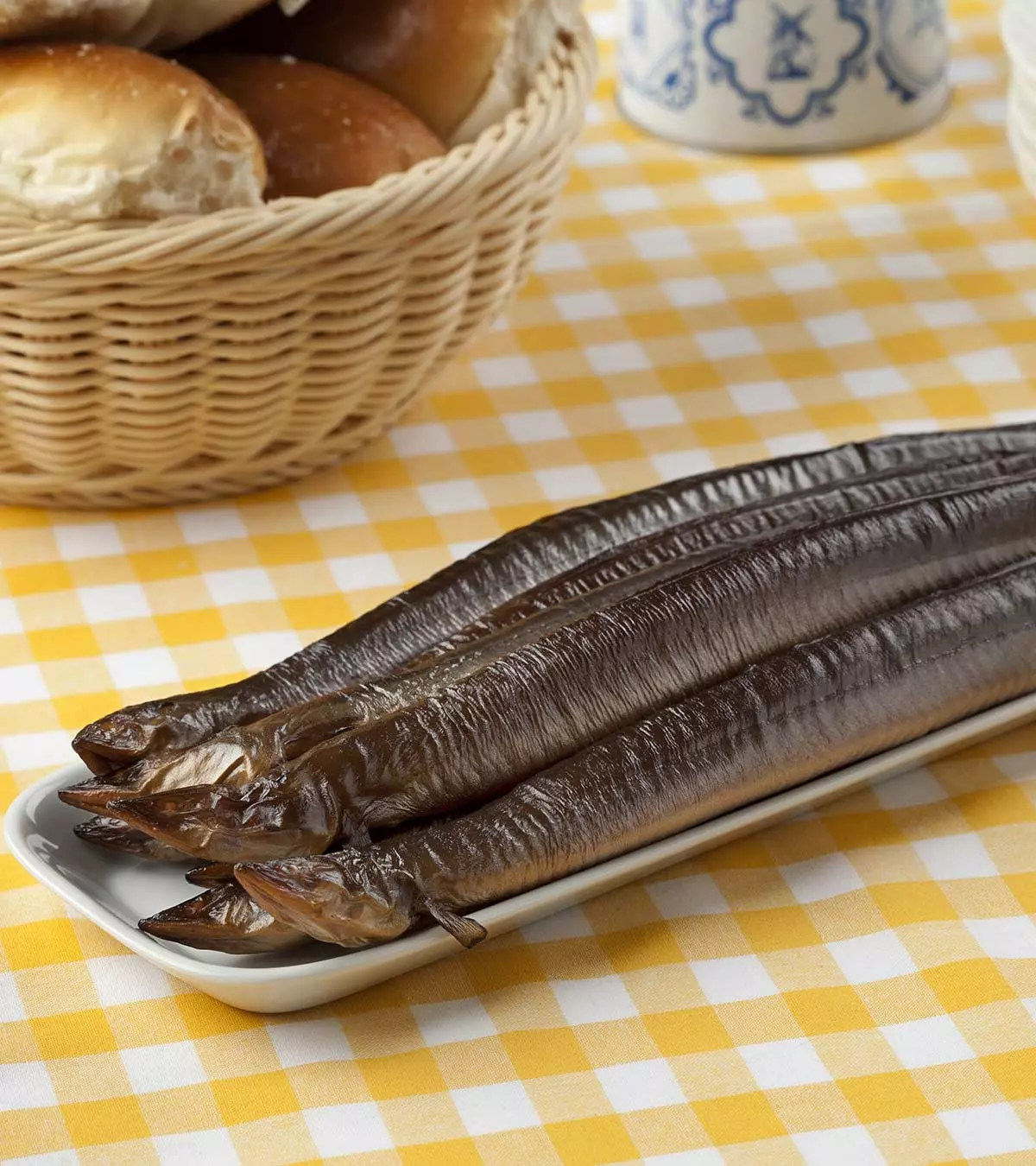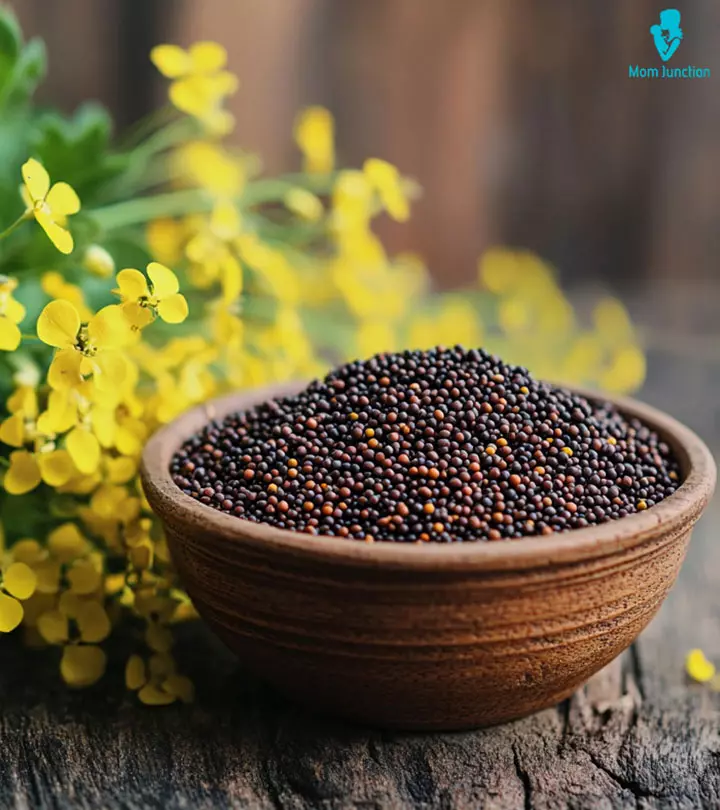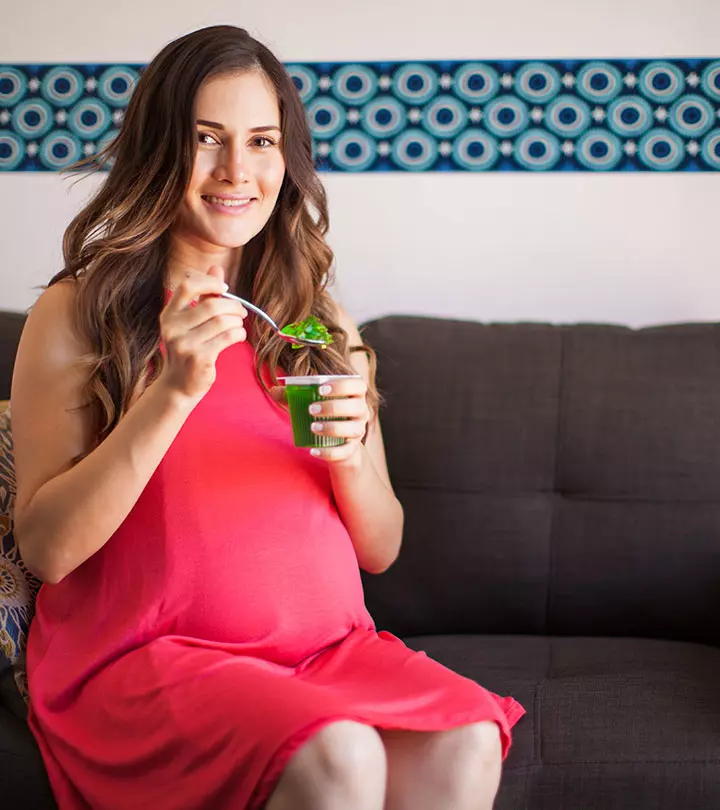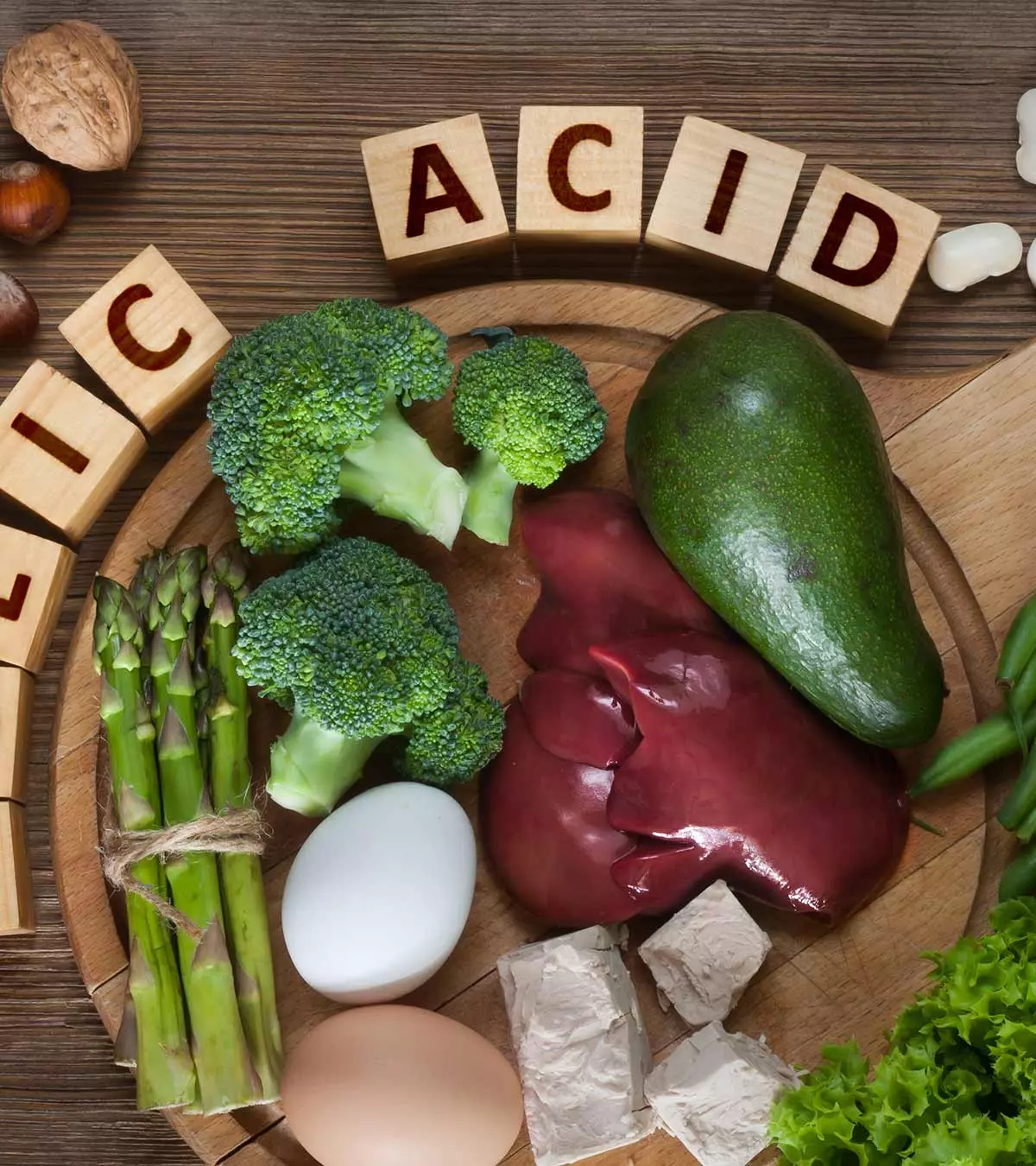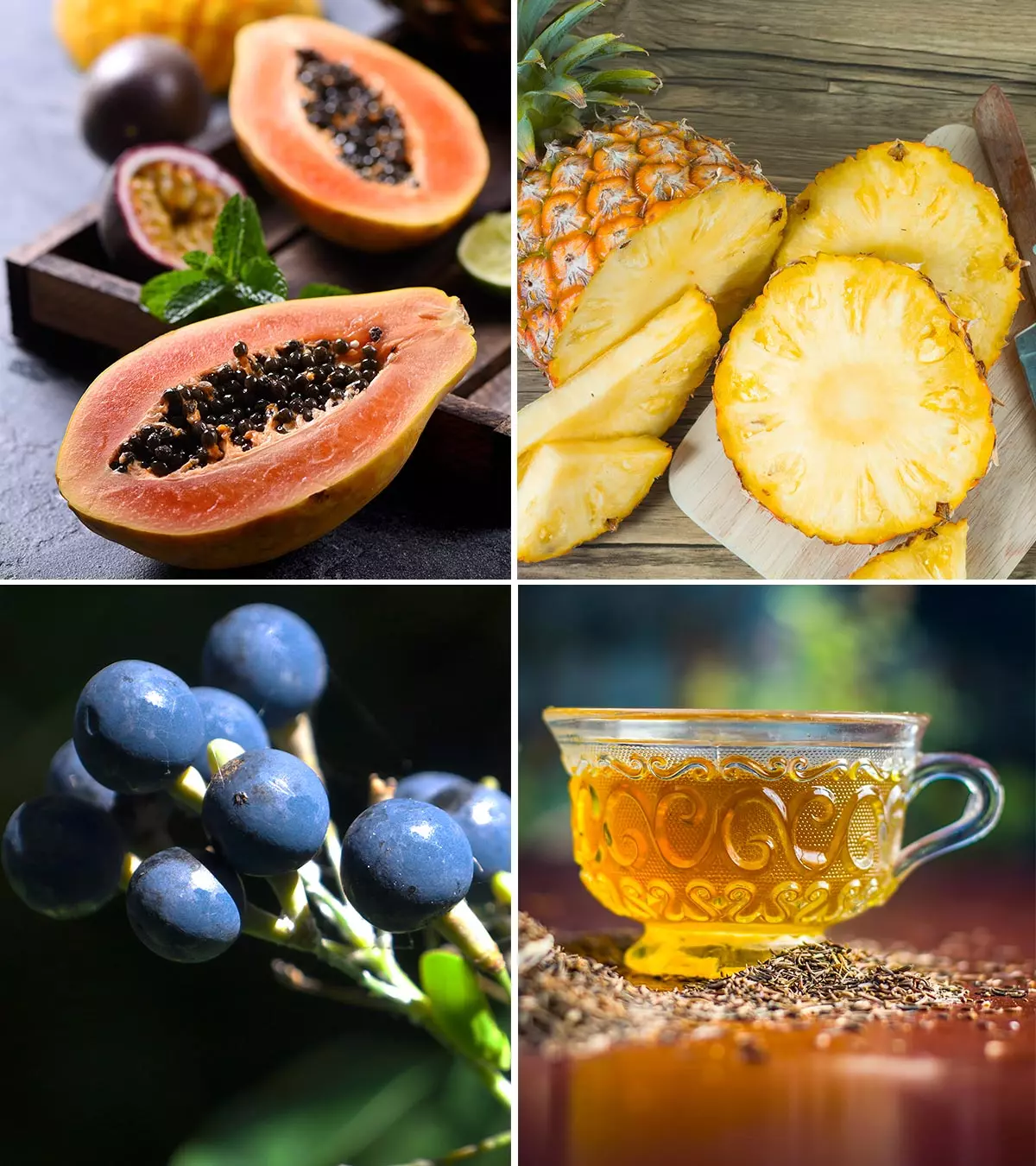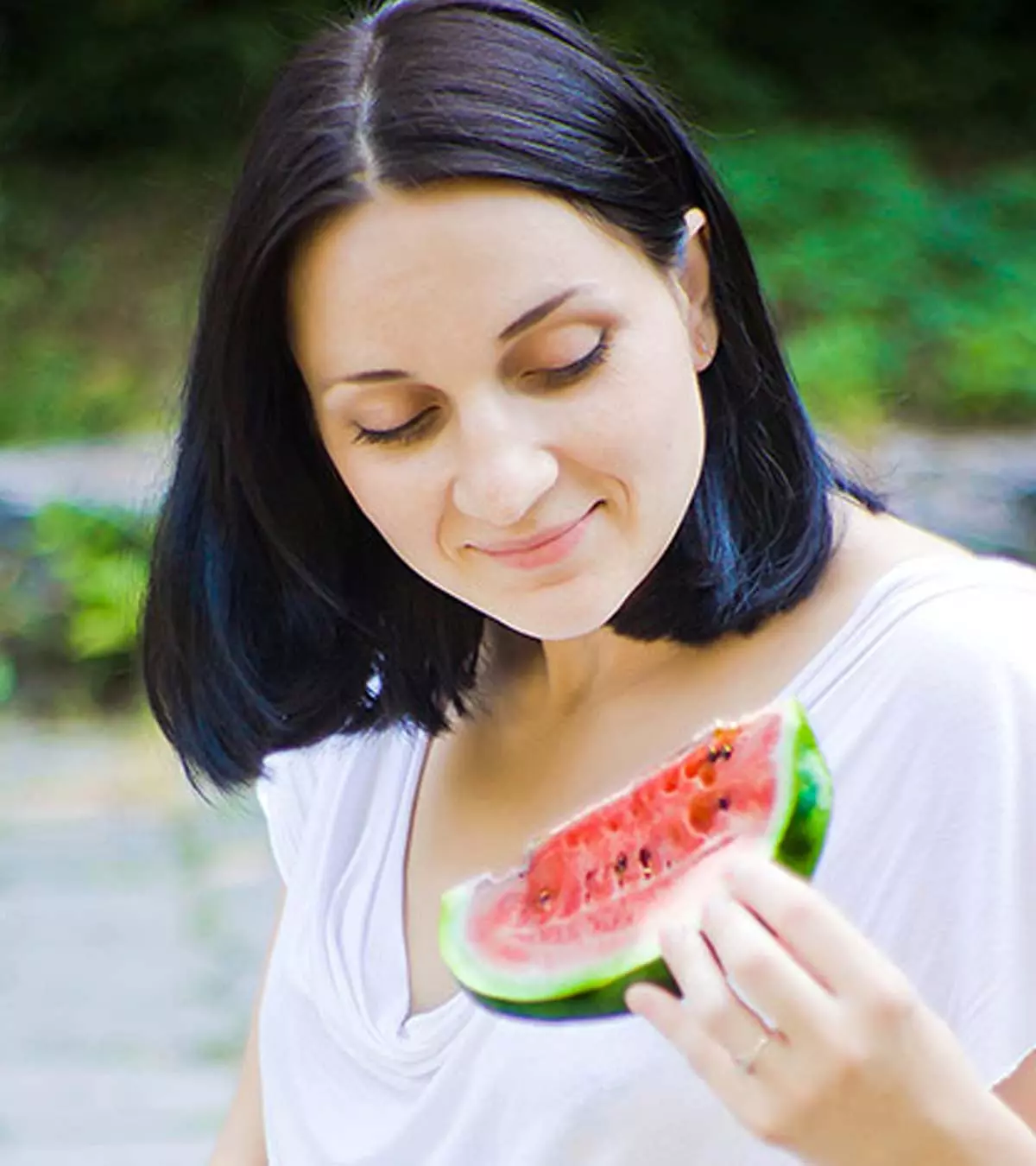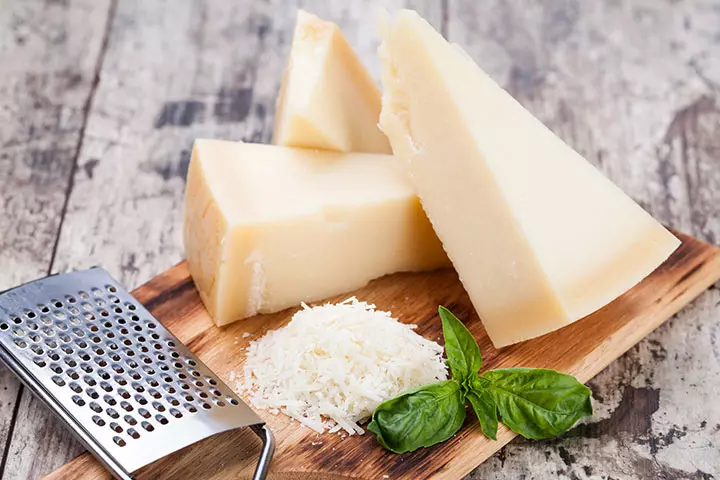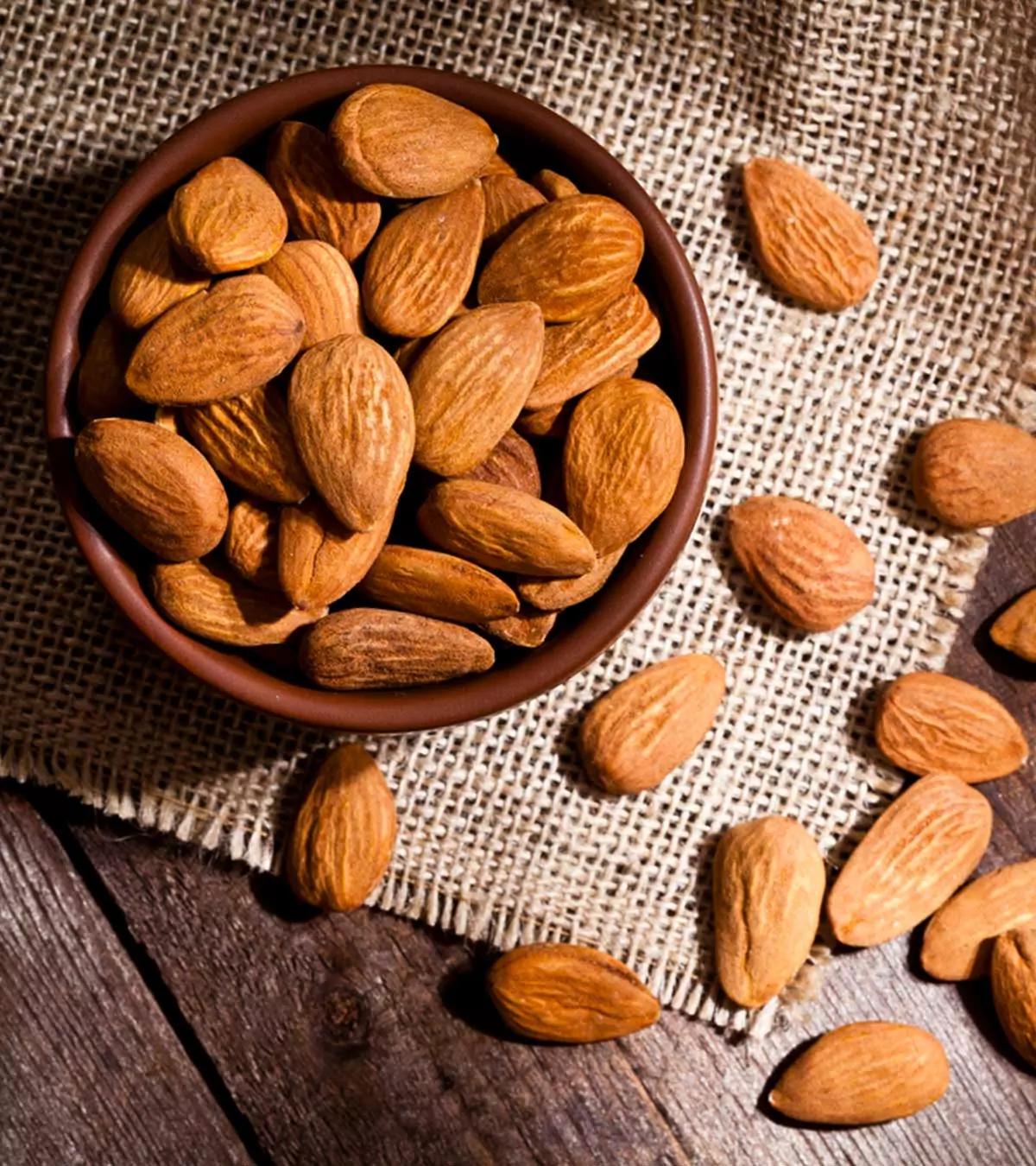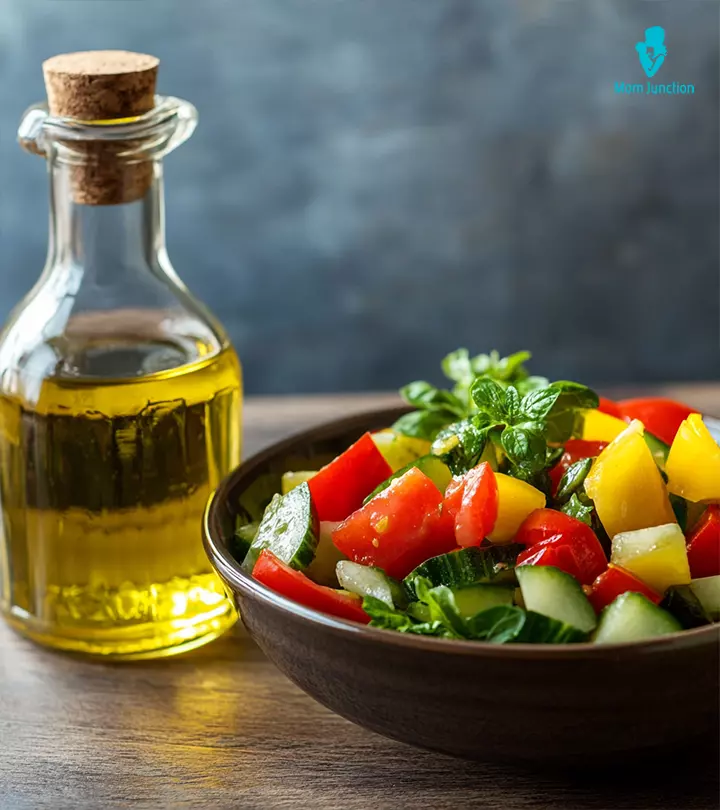
Image: Midjourney/ MomJunction Design Team
Every food should be consumed within limits during pregnancy. Similarly, while you can safely have vinegar during pregnancy, knowing its proper usage is important to avoid possible complications.

Vinegar adds tanginess and a kick to your meals. With its high antioxidantiCompounds that inhibit oxidation and delay cell damage content, vinegar can contribute to a healthy baby and pregnancy. However, consuming too much may induce certain side effects, especially in the later trimesters.
So, if you have been adding vinegar to most of your dishes and want to know if you can continue to do so while pregnant, read on. This post tells you about the benefits of vinegar for pregnant women, its side effects, and the types of vinegar you can consume.
Key Pointers
- It is advised to consume vinegar in limited amounts during pregnancy.
- Vinegar is a rich source of antioxidants and helps keep sodium consumption levels in check.
- Pregnancy-safe vinegar includes balsamic vinegar, apple cider vinegar, and rice vinegar.
- One should, however, consult with their healthcare professional before including vinegar in their diet to avoid complications.
Is Vinegar Safe During Pregnancy?
It is better to consume vinegar in limited amounts when expecting as there is no scientific evidence to prove the safety of vinegar during pregnancy (1). In most cases, you can eat salads, sautés and other foods with a dash of vinegar in pregnancy without concern.
Infographic: How To Have Vinegar During Pregnancy?
Some thing wrong with infographic shortcode. please verify shortcode syntaxBenefits Of Eating Vinegar
1. Increased Calcium Absorption
It’s important to get enough calcium when pregnant, to support your baby’s growing bones and protect your own. Vinegar can actually help your body absorb more calcium from your diet (2).
2. Rich Source Of Antioxidants:
- Vinegar contains a high amount of polyphenols which are antioxidants that can be especially good for you when you are pregnant (3).
- The antioxidants present in vinegar will protect your cells against any damage that might occur from free radicals.
- Having more antioxidants while you are pregnant will help to protect both you and your baby from any oxidative stress. It will help the overall health of your pregnancy.
3. A Good Flavoring Agent With No Added Sodium Health Risks:
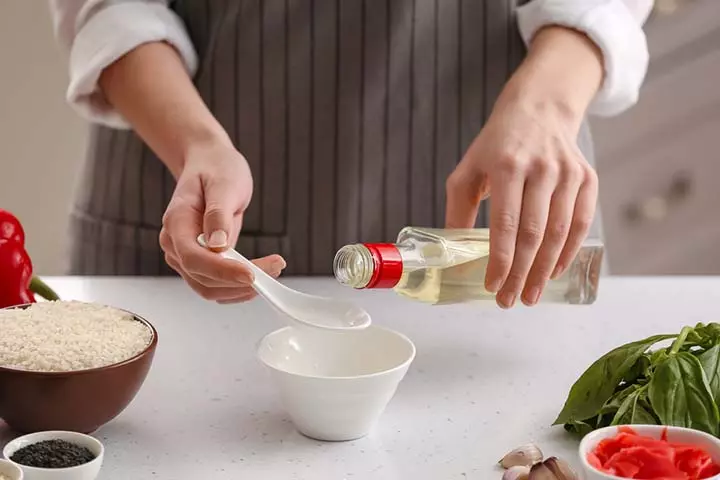
While you are pregnant and even otherwise, it is important to keep your sodium intake within the recommended levels, which is 2,300 mg maximum per day (4).
- During pregnancy, you may crave extra sodium through various dips or other snacks. It can pose a health risk to both you and your baby, as high levels of sodium can cause health complications.
- Using vinegar is a great way to flavor your food without adding extra sodium. Also, vinegar is available in different flavors, so you can always mix and match to create interesting flavors.
Dr. Amir Marashi, a New York-based board-certified cosmetic gynecologist and pelvic pain specialist, says, “There are reports that vinegar may be helpful with nausea and morning sickness, and I have a few patients who have experienced this. However, we need to understand that vinegar is an acid that may bother you, so it is best to dilute it in warm water and see if it agrees with you. I personally prefer ginger and feel it could be a good preventative measure for nausea.”
 Quick fact
Quick fact4. Helps prevent bacterial infections
The probiotic properties of vinegar help sustain good bacteria in the gut, while its acetic acid content works to eliminate harmful bacteria from food. Dressing salads with lemon juice and vinegar has been proven to help prevent contamination risks from bacteria like salmonella. The acetic acid content found in vinegar is also purported to help in reducing cholesterol levels (9) (10).
Note: It is not a replacement for medicines and should be used under the doctor’s guidance.
When Should You Limit Vinegar Consumption?

While you are pregnant, it is common to experience heartburniBurning feeling in the chest when acid travels up from the stomach towards the throat , which occurs during the second and third trimester.
- Even though all pregnancies are unique, and you may have not experienced it in your earlier pregnancy, eating certain foods can induce acid reflux and increase heartburn.
- Vinegar is high in its acidic content, and excess consumption of acidic foods can cause heartburn while you are pregnant or increase your heartburn (5).
- If you experience an increase in acidity after having vinegar, or if you feel it triggers heartburn, stop or limit your intake.
- While apple cider vinegar during pregnancy has its own benefits (see point 1), there are instances when having it in excess can cause negative effects too. Therefore, it is better to be cautious about the quantity.
 Quick tip
Quick tipSide Effects Of Having Vinegar During Pregnancy

Is vinegar harmful during pregnancy? Well, while vinegar in limited amounts will not harm your pregnancy, there are certain food items that contain vinegar that could cause potential harm.
- Avoid eating raw or undercooked seafood or shellfish like oysters that are often served with vinegar sauce. While the vinegar will not cause you any problems, the undercooked or raw seafood can pose serious health concerns.
- Apple cider vinegar has a high amount of acid content, which can cause several dental issues, including erosion of your tooth enamel (6).
- It can induce vomiting and nausea during pregnancy in those who cannot stomach the taste and smell (6).
- Vinegar can interact with certain medications. For example, apple cider vinegar may affect how anti-diabetic medications and diuretics work (1).
- Intake of vinegar could worsen conditions like hypokalemia in people with low potassium levels (9).
- In pregnant women with pre-existing kidney disease, drinking vinegar could prove dangerous as the organ struggles with filtering out the acids (10).
How To Have Vinegar While Pregnant?
The market is full of a number of flavors of vinegar today. It makes for a great pregnancy addition that will help to flavor your foods and side dishes. Here are a few types of vinegar that you can try out while you are pregnant. Check out the taste of each and see which one you like the most:
1. Balsamic Vinegar:
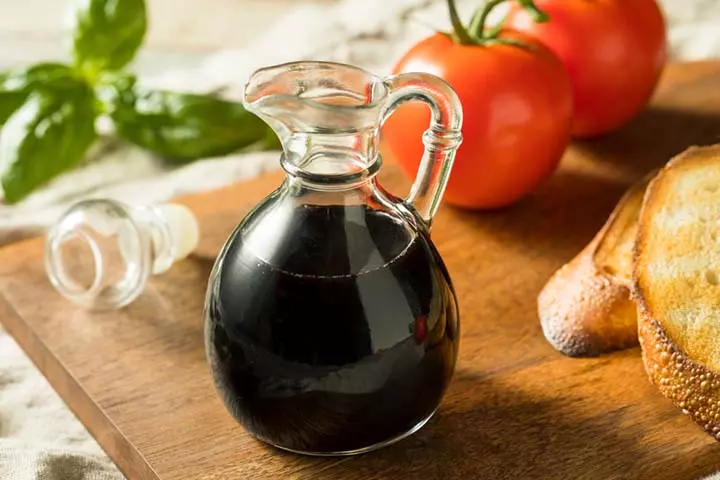
Balsamic vinegar has a strong taste that is flavored with a hint of sweetness too. It is a great addition to your homemade salads, sautéed vegetables, sautéed meats, noodles, rice or even fruit salads. Note that it does contain a higher amount of sugar as compared to other types of vinegar.
2. Rice Vinegar:
Rice vinegar has a very sweet but also a very strong sour taste, even though the entire effect is mild. You can add it to your soups or stir-fried foods or eat it as a dipping sauce for sushi and salads. It can also be used in pickles, sauces, or marinades as a substitute for white vinegar.
3. Apple Cider Vinegar:
Apple cider vinegar works best as a marinade or dressing and has a unique taste.
Speaking of the health benefits of apple cider vinegar, a pregnant mother describes how it helped her combat severe allergies during her first pregnancy. Her obstetrician/gynecologist recommended a specific way to prepare the ACV mixture. According to her, “Warm up half a cup of water, shake up your apple cider vinegar again, shake it up real good, measure two spoons and put them in the water, and that’s it (i).” If you’re interested in the possible advantages of apple cider vinegar, you can try out the recommended mixture with the help of your healthcare provider.
Frequently Asked Questions
1. What is the recommended daily limit for vinegar consumption during pregnancy?
There is no recommended daily limit for vinegar consumption in pregnant women. However, they may consume one to two tablespoons of it in diluted form (8).
2. Should I avoid some types of vinegar during pregnancy?
Unpasteurized vinegar should be avoided during pregnancy, as the bacteria in them may cause complications in pregnant women (8). Synthetic vinegar should also be avoided.
3. Can vinegar help improve digestion during pregnancy?
Diluted apple cider vinegar, as a natural remedy, may help improve the symptoms of indigestion during pregnancy (8).
4. What should I consider when choosing vinegar during pregnancy?
When selecting vinegar, opt for pasteurized types to reduce the risk of bacteria. Also, take into account your tolerance for acidity, particularly if you have a history of heartburn or digestive problems.
5. Is vinegar pickle safe during pregnancy?
New York-based obstetrician and gynecologist Dr. Kecia Gaither, says, “It is normal for pregnant women to crave certain foods. While vinegar-based pickles are safe during pregnancy, they can irritate the stomach lining and cause water retention and high blood pressure due to their salt content, if consumed excessively.”
Natural vinegar is obtained from the production process of fermented foods such as fruit juices. It is a quick taste enhancer and can provide useful antioxidants in the diet. You can use vinegar to flavor your salads and sautés. However, it is quite acidic and may aggravate heartburn that usually occurs during the second and third third trimestersiWeek 27 to end of pregnancy of pregnancy. Dental issues may arise as well. Therefore, it would be best to consume limited amounts of vinegar during pregnancy to reap its benefits and protect your digestive health from the side effects.
Illustration: Is It Safe To Use Vinegar During Pregnancy?
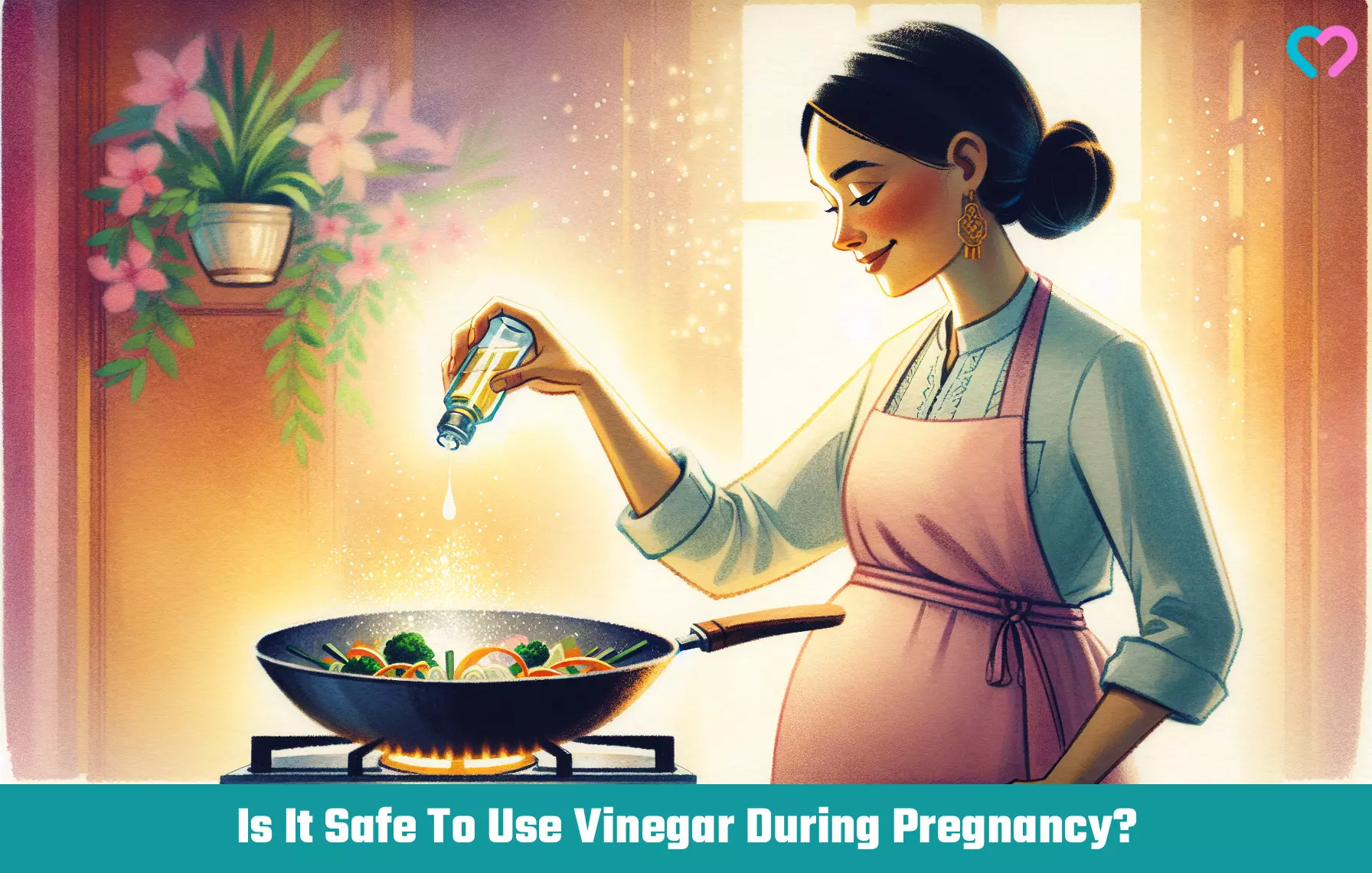
Image: Dall·E/MomJunction Design Team
Personal Experience: Source
MomJunction articles include first-hand experiences to provide you with better insights through real-life narratives. Here are the sources of personal accounts referenced in this article.
i. How to mix a ACV drink while pregnant & nursing || obgyn recommendation.https://www.youtube.com/watch?feature=shared&v=CbmvPJ-_LD0
References
- Apple Cider Vinegar.
https://medlineplus.gov/druginfo/natural/816.html - Study Suggests Vinegar Increases Calcium Absorption from Foods.
https://versatilevinegar.org/study-suggests-vinegar-increases-calcium-absorption-foods/ - Antioxidant Activities, Phenolic Profiles, and Organic Acid Contents of Fruit Vinegars.
https://www.mdpi.com/2076-3921/8/4/78 - Sodium in Your Diet.
https://www.fda.gov/food/nutrition-education-resources-materials/sodium-your-diet - ACETIC ACID.
https://www.vdh.virginia.gov/environmental-health/public-health-toxicology/acetic-acid/ - Exploring the health benefits of Apple Cider Vinegar.
https://health.clevelandclinic.org/exploring-the-health-benefits-of-apple-cider-vinegar - Debunking the health benefits of apple cider vinegar
https://www.uchicagomedicine.org/forefront/health-and-wellness-articles/debunking-the-health-benefits-of-apple-cider-vinegar - Vinegar in Pregnancy
https://ovumhospitals.com/blog/vinegar-in-pregnancy/#:~:text=The%20unpasteurized%20variety%20contains%20bacteriacan%20trigger%20and%20complicate%20pregnancy. - What Apple Cider Vinegar Can (and Can’t) Do for You.
https://health.clevelandclinic.org/exploring-the-health-benefits-of-apple-cider-vinegar - Debunking the health benefits of apple cider vinegar.
https://www.uchicagomedicine.org/forefront/health-and-wellness-articles/debunking-the-health-benefits-of-apple-cider-vinegar
Community Experiences
Join the conversation and become a part of our nurturing community! Share your stories, experiences, and insights to connect with fellow parents.
Read full bio of Jennifer House
- Dr. Kecia Gaither is double board-certified in Ob/Gyn and Maternal Fetal Medicine. She is the director of perinatal services/maternal fetal medicine at NYC Health + Hospitals/Lincoln in the Bronx. Additionally, she is an associate professor of Clinical Obstetrics and Gynecology with Cornell Weill Medicine. Dr. Gaither also holds a masters degree in Public Health and an MS/MBA in Healthcare Policy and Research/Healthcare Leadership.
 Dr. Kecia Gaither is double board-certified in Ob/Gyn and Maternal Fetal Medicine. She is the director of perinatal services/maternal fetal medicine at NYC Health + Hospitals/Lincoln in the Bronx. Additionally, she is an associate professor of Clinical Obstetrics and Gynecology with Cornell Weill Medicine. Dr. Gaither also holds a masters degree in Public Health and an MS/MBA in Healthcare Policy and Research/Healthcare Leadership.
Dr. Kecia Gaither is double board-certified in Ob/Gyn and Maternal Fetal Medicine. She is the director of perinatal services/maternal fetal medicine at NYC Health + Hospitals/Lincoln in the Bronx. Additionally, she is an associate professor of Clinical Obstetrics and Gynecology with Cornell Weill Medicine. Dr. Gaither also holds a masters degree in Public Health and an MS/MBA in Healthcare Policy and Research/Healthcare Leadership.
Read full bio of Ria Saha
Read full bio of Swati Patwal
Read full bio of Lorraine Teron









